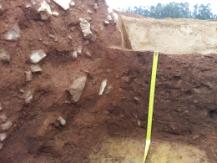Molecular fingerprinting of soil from north-west Spain
Posted on Wednesday 1 August 2018

A York researcher has published a new paper in the journal Radiocarbon that shows us when, how and why Soil Organic Matter dates are reliable—or not.
Dr Cruz Ferro-Vasquez, from the Department of Archaeology at the University of York, evaluated the complexities of radiocarbon dates from soil organic matter (SOM) in archaeological scenarios, from Neolithic to medieval sites in nort-west Spain.
Dr Ferro-Vasquez says: "This is of crucial importance to all of us who question the accuracy of SOM dates for archaeological aims. Implications go beyond archaeology, though, as results are also useful for understanding SOM dynamics and C storage in soils.

"These outcomes were accomplished by the combined efforts of archaeologists, soil scientists and organic geochemists. They engaged in the molecular characterisation of different soil fractions, from samples from settlements in NW Spain that were also 14C dated. Again, it becomes evident that the joining of forces of research communities that barely mix gives rise to important new insights in SOM age fractionation. The study provides guidance for the identification of "erroneous" SOM fractions and opens new avenues in archaeology and paleoenvironmental research."
Read the full paper in Radiocarbon at https://doi.org/10.1017/RDC.2018.62
